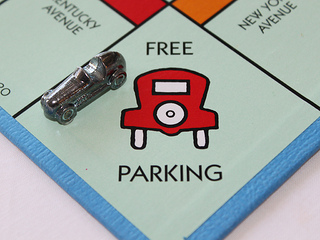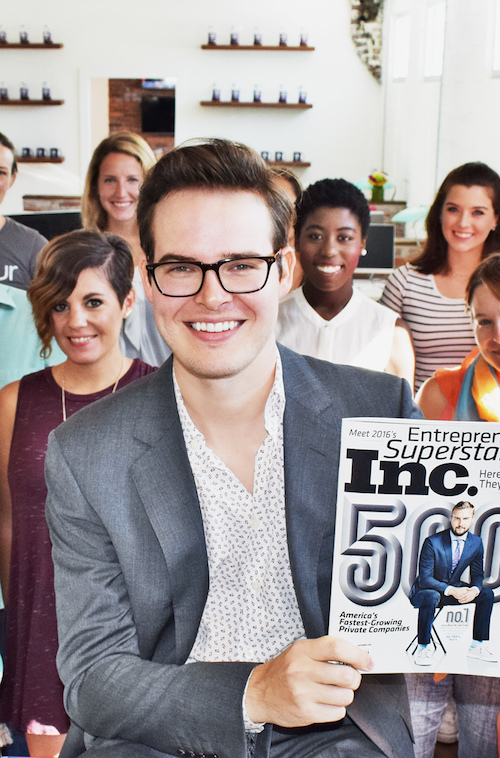Why It May Cost You More When It’s Free
There is a point in the raunchy comedy Super Troopers when the brain trust of the group, Farva, is filling up his squad car with gas.
He notices a sign at the gas station advertising a free hot dog with a $20 fill up (remember those days?). Farva is disappointed when his fill up comes to a total less than $20, so he empties some gas into a trash can so he can get his free hot dog.
I remember thinking, “What an idiot!” while I giggled at the movie. And yet, I (and everyone else) tend to be just as big an idiot when the word “free” is bandied about.
Just think about the last time you needed to buy something from Amazon. If it was a purchase under $25, the retail giant helpfully informed you that just adding $X to your order will qualify you for free shipping. So, in order to save yourself around $4 in shipping costs, you made an impulse purchase that end up costing more total. I’ve certainly done it, and I’m likely to do it again—as are you. Deep down, we’re not so different from the gas-wasting Farva.
Luckily, Dan Ariely, behavioral economist and author of the book Predictably Irrational has some insights for us on why the word free scrambles our brains, and what we can do about it:
The Word “Free” Can Change Your Behavior

You don’t have to look far to find examples of free offers making people act in ways they normally don’t.
For example, even the most clutter-averse individual will find it difficult to turn down free items offered at conferences or banking offices.
Similarly, “free gifts with purchase” can sometimes be enough of an enticement to convince an on-the-fence shopper to make a purchase.
In my own life, I remember being unsure whether I really wanted or needed a new blouse—but being convinced I really ought to buy two because the second one was free.
Ariely observed a promotion in New York City that drives home the reality of how the concept of “free” can affect our behavior. A nightclub offered patrons free tattoos for attending a particular event, so Ariely and his team decided to interview the patrons opting for these tattoos. 68% said they would not be getting the tattoo if it were not free, which is pretty startling considering the fact that we are talking about permanent body modification. In addition, a total of four of the 76 people in line for the tattoos didn’t even know what they wanted, and an additional five did not know where they wanted their new ink.
Clearly, the concept of “free” affects our behavior, since 52 people in line that night would (presumably) still be tattoo-free if they hadn’t been offered free tattoos.
A Behavioral Economist’s Understanding of Free
Why on earth does the word free have such a strange effect on our minds? You can be relatively certain that had the nightclub been offering $1 tattoos rather than free ones, there would not have been 76 people in line—and certainly not individuals who didn’t even know what ink they wanted. A $1 tattoo is an incredible deal, but it’s definitely not enough of an enticement to change behavior.
According to Ariely, the issue comes down to a fear of loss. He writes in Predictably Irrational:
“Most transactions have an upside and a downside, but when something is FREE! we forget the downside. FREE! gives us such an emotional charge that we perceive what is being offered as immensely more valuable than it really is. Why? I think it’s because humans are intrinsically afraid of loss. The real allure of FREE! is tied to this fear. There’s no visible possibility of loss when we choose a FREE! items (it’s free). But suppose we chose the item that’s not free. Uh-oh, now there’s a risk of having made a poor decision—the possibility of a loss.”
Avoiding this fear of possible loss makes free items seem much more attractive. After all, there’s no way you can lose money on the free item—and that is usually the downside or cost of any transaction. Without the loss of money, we think of the transaction as only having an upside or positive outcome for us.
The Costs of Free
Of course, just because a transaction is financially free (or just because it feels free, which was Farva’s downfall) does not mean that it is without costs.
For instance, the night of the free tattoos, a competing tattoo artist happened to be at the nightclub, observing the proceedings. She told Ariely’s research assistant that the free tattoo artist was using unhygienic and potentially hazardous cleaning and health practices—and that there did not appear to be any disinfectant being used. Considering the fact that getting a tattoo can potentially make you vulnerable to blood diseases including Hepatitis and HIV, the possible cost of a tattoo has little to do with the amount of money you hand over to the artist.
And that is the sort of downside that many of us are unable to recognize when we are dazzled by the word “free.” It pays to really think through the consequences of a free offer before enthusiastically signing up.
Combating the Effect of Free
A friend of mine is a master crafter who home-schools her daughter. They have a local thrift store that offers great art supplies for incredible discounts. My friend, however, only buys things at the thrift store that she’d be willing to pay full price for. That may seem counter-intuitive, but that helps her to remember to only buy things she’ll really use, rather than stuff that’s just cheap.
This brilliant strategy for thrift store finds works equally well for free items. Just say no to free things (whether they’re tattoos at a night club or yet another stress ball at your next conference) unless you would be willing to spend the money on them.
Dan Ariely also offers another great tip for avoiding Farva-like behavior. Imagine your free with purchase item (whether it’s a hot dog or shipping) actually costs 50 cents. If it doesn’t seem like as good a deal then, it will be much easier to walk away.
The Bottom Line
The word “free” may have a negative effect on our ability to be rational. But recognizing that free transactions will still cost you in some way can really help you to minimize the downsides of free items.
Has “free” ever suckered you into a bad deal?
Transcript: Just click show


![101 Money Management Skills [Take the Quiz & Test Your Money Nerdyness]](jpg/101-money-skills-everyone-should-have.jpg)



@Elle_CM @ptmoney Never thought of it that way. Thanks for sharing this.
Great post! I love the references to Farva. Don’t forget to use rewards credit cards too!
Great post
Ha! Great references to Farva!
This is great PT:-) Will keep it for easy access to remind me…….about free (cell)fones with points that end up costing a fortune!
I did not realize that you wear blouses……(paragraph 9)………That’s ok ~ so do I
There is certainly no free lunch! I have made my share of mistakes (who hasn’t) but am now trying to follow as much as possible rules similar to the ones you list in the post.